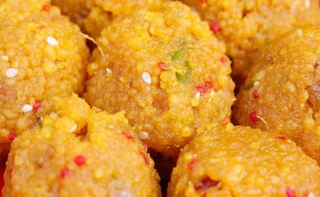Commonly offered as prasad, Motichoor Ladoo is a favourite festive treat across India. Admit it, once you start having it, you cannot just hold back at one. Motichoor Ladoo or Motichur Ladoo is a round-shaped sweetmeat made from fine, tiny balls of besan. The chickpea flour globules is fried in ghee or oil, and soaked in sugar syrup. The sweet, pearl-like balls are then moulded into ladoos. Motichur Ladoo is originally said to hail from the Northern region of the country, but happens to be a favourite across the country and the world.The word 'motichoor' literally translates to crushed pearls and honestly we think their couldn't have been a better name for the delicacy. Originally associated with states like Rajasthan and Uttar Pradesh, these ladoos were also easy to store in the torrid temperatures, and wouldn't go bad for days. Motichoor Ladoo has also found its mention in ancient and medieval texts of South and Eastern regions.
Motichoor literally translates to 'crushed pearls'
Advertisement
For the latest food news, health tips and recipes, like us on Facebook or follow us on Twitter and YouTube.
Advertisement
